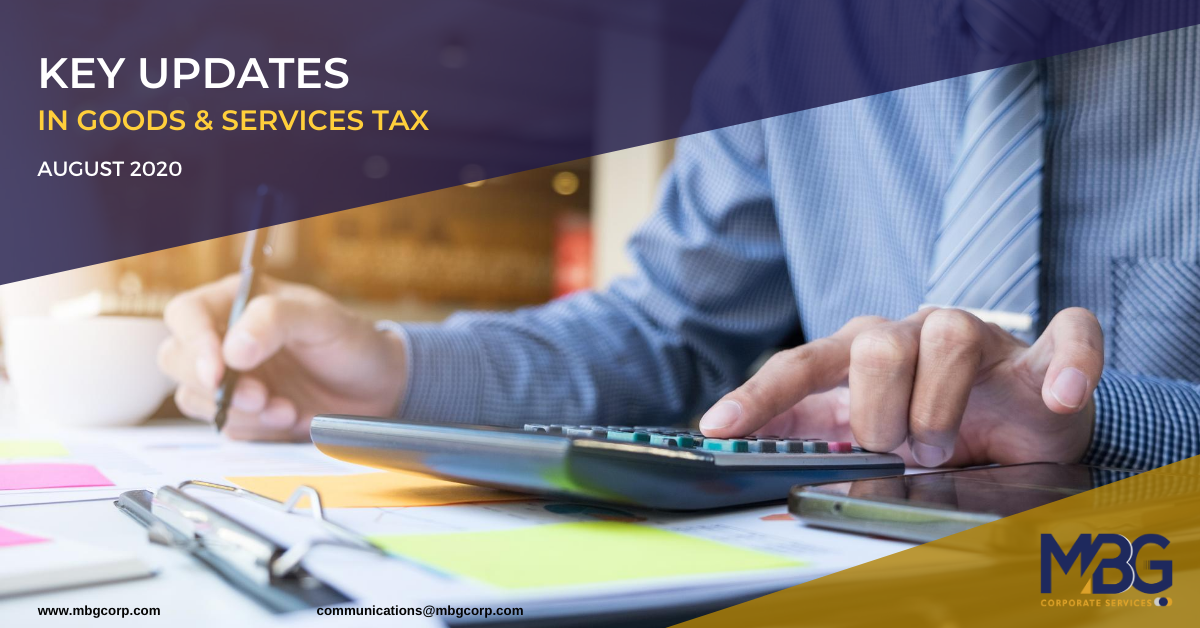Aug’20: Key Goods & Services Tax (GST) Updates

GST E-invoicing for Turnover > 5000 million
Central Board of Indirect Taxes & Customs (CBIC) vide Notification No. 61/ 2020-Central Tax (CT), dated 30th July 2020 has notified E-invoicing as mandatory for registered persons having turnover above 5000 million. Further, units located in Special Economic Zone (SEZ) are excluded from the e-invoicing requirement. Previously, the threshold was 1000 million and the SEZ unit was not exempted from e-invoicing. However, irrespective of the turnover, e-invoicing shall also not be applicable to the following categories of registered person:
- The insurer or a banking company or a financial institution;
- A Goods Transport Agency;
- A registered person supplying passenger transportation service; and
- A registered person supplying services by way of admission to the exhibition of cinematographic films in multiplex screens.
Revised Format / Schema for GST E-invoicing
CBIC vide Notification No. 60/ 2020 – Central Tax (CT), dated 30th July 2020 has notified the revised Format/Schema for e-Invoice under GST by replacing existing FORM GST INV-01 with new “FORM GST INV-1”.
Extension of Due Date for GSTR-4
CBIC vide Notification No. 59/2020-Central Tax (CT), dated 13th July 2020 has extended due date of GSTR-4 (Composition Dealer) for Financial Year 2019-20 to 31st August 2020 which earlier was 15th July 2020.
Rule notified for filing GSTR – 3B & GSTR -1 through SMS
CBIC vide Notification No. 58/2020 – Central Tax (CT), 01st July 2020 has facilitated ease of filing the GST returns for taxpayers having ‘Nil’ tax liability for any tax period. The taxpayer can file GSTR-1 for outward supplies and GSTR-3B summary return through an SMS with the help of One Time Password (OTP) received on the mobile number registered with Goods and Services Tax Network (GSTN) as per notified Rule 67A.
Services by “intermediaries” outside India is not an export: Gujarat HC
Hon’ble Gujarat High Court in case of Material Recycling Association of India vs. Union of India held that the provision of Section 13(8)(b) r.w. Section 2(13) of the IGST Act, 2017 (pertaining to intermediary services) cannot be considered as ultra vires or unconstitutional.
In this case, the petitioner is an association comprising of the recycling industry engaged in the manufacture of metals and casting, etc., the petitioner also acts as an agent for scrap recycling companies based outside India and it is engaged in providing business promotion and marketing services for such principals located outside India. The petitioner has no role to play in the actual sale and purchase of recycled scrap, as the goods supplied by foreign clients to its purchasers are directly shipped, and thereafter, such goods are cleared by the purchaser from the Customs Authorities on its own account. Accordingly, the petitioner receives only the commission upon receipt of sale proceeds by its foreign client in convertible foreign exchange.
The Hon’ble Gujarat High Court observed that only because, the invoices are raised on the person outside India with regard to the service commission and foreign exchange is received in India, the service supplied would not qualify to be export of services. It was also observed that mentioned provisions related to intermediary services are constitutionally valid and do not find contention of the petitioner of double taxation as tenable in eyes of law. Due to these provisions in the GST law, indenting agents will be considered providing ‘Intermediary Services’ and have to pay tax on services rendered outside India even if the consideration is received in convertible foreign exchange.
This would mean that entities like BPOs, exporters, captive units of multinationals that supply such support services to other companies outside India, will have to discharge 18% additional GST to comply with GST laws.
Last Updated: 5th August 2020 This article is contributed by:
CA Vaibhav Matta Assistant Director, Taxation
Tag: GST E-invoicing


